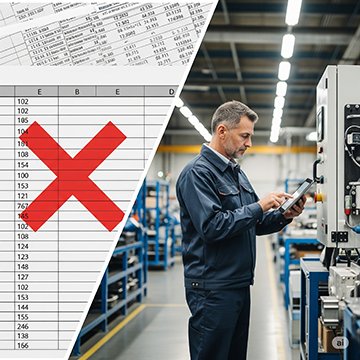Published: January 26, 2023 | Updated: October 07, 2025
Published: January 26, 2023 | Updated: October 07, 2025
The Power of Digital Transformation in Plant Maintenance
 Digital transformation, the integration of digital technology into all areas of a business, is revolutionizing plant maintenance. A Computerized Maintenance Management System (CMMS) is a crucial first step in this transformation, offering significant advantages over traditional spreadsheet-based maintenance management. This article explores the power of digital transformation in plant maintenance.
Digital transformation, the integration of digital technology into all areas of a business, is revolutionizing plant maintenance. A Computerized Maintenance Management System (CMMS) is a crucial first step in this transformation, offering significant advantages over traditional spreadsheet-based maintenance management. This article explores the power of digital transformation in plant maintenance.
From Chaos to Control: Why CMMS Trumps Spreadsheets
General Usability: Streamlining Maintenance Management
Spreadsheets, while seemingly simple, present numerous usability challenges for maintenance management. Sharing and collaborating on spreadsheets can be a nightmare, with files often locked or overwritten, leading to data loss and frustration. Historical data, crucial for business intelligence and decision-making, is difficult to maintain and can easily be corrupted. Manually tracking timestamps and user information is cumbersome and prone to errors, hindering effective maintenance scheduling and analysis.
A CMMS eliminates these usability issues. With secure access controls and concurrent user capabilities, a CMMS ensures that the system is always available, preventing accidental file locking and data loss. Automated historical data tracking and reporting capabilities provide valuable insights for informed decision-making. Automatic timestamps and user identification enhance accountability and streamline communication, simplifying maintenance scheduling and follow-up.
Inventory Control: Optimizing Stock Management
Spreadsheet-based inventory control is often inefficient and error-prone. Searching for items can be time-consuming, and the risk of duplicate purchases or stockouts is high. The lack of real-time inventory updates can lead to inaccurate stock levels, resulting in delays and increased costs.
A CMMS simplifies inventory management with advanced search and filtering capabilities. Users can quickly locate items, minimizing the risk of duplicate purchases and ensuring accurate stock levels. Automated reordering features, triggered by pre-defined minimum stock levels, prevent stockouts and optimize inventory control.
Work Orders and Preventive Maintenance: Streamlining Maintenance Processes
Managing work orders and preventive maintenance (PM) tasks with spreadsheets is a complex and inefficient process. Tracking work order status, assigning tasks, and ensuring timely completion can be challenging. Supervisors often spend excessive time managing spreadsheets, reducing their ability to focus on other critical tasks.
A CMMS streamlines work order and PM management. Authorized users can easily submit work requests, which can be quickly converted into work orders and assigned to technicians. Technicians can update task status and add notes directly within the system, improving communication and collaboration. Automated PM scheduling and tracking ensure that preventive maintenance is performed on time, minimizing downtime and extending equipment lifespan.
Mobile Accessibility: Empowering On-the-Go Maintenance
Spreadsheets are not designed for mobile use. Navigating and editing spreadsheets on small screens is difficult and frustrating, limiting their usefulness for on-site maintenance tasks.
Mobile CMMS applications provide technicians with access to critical information and functionalities directly on their smartphones or tablets. They can view assigned work orders, update task status, add notes, and even capture photos of equipment issues, all from the plant floor. This improves efficiency, reduces response times, and enhances data accuracy.
Beyond the Basics: Additional CMMS Advantages
Checklists: Ensuring Consistent Maintenance Procedures
CMMS software allows you to create and manage checklists for various maintenance tasks. These checklists ensure that all necessary steps are followed consistently, reducing the risk of errors and improving maintenance quality.
Scheduling: Optimizing Maintenance Activities
Advanced scheduling features in a CMMS enable you to plan and optimize maintenance activities, taking into account resource availability, equipment schedules, and other factors. This helps minimize disruptions to production and maximize maintenance efficiency.
Project Management: Managing Complex Maintenance Projects
For larger maintenance projects, a CMMS offers project management functionalities, allowing you to track progress, manage resources, and ensure timely completion.
Embrace the Future of Plant Maintenance with a CMMS
Transitioning from spreadsheets to a CMMS is a crucial step in the digital transformation of plant maintenance. A CMMS offers significant advantages in usability, inventory control, work order and PM management, and mobile accessibility. By embracing a CMMS, plants can streamline maintenance processes, improve efficiency, reduce costs, and enhance overall performance. Don't get left behind – ditch the spreadsheet and embrace the future of plant maintenance with a CMMS.
FAQs
What are the benefits of switching from spreadsheets to a CMMS?
A CMMS improves usability, prevents data loss, and streamlines maintenance scheduling compared to spreadsheets.
How does a CMMS enhance inventory control in plant maintenance?
It offers real-time tracking, automated reordering, and quick search features to prevent stockouts and duplicate purchases.
Can MAPCON CMMS help with preventive maintenance scheduling?
Yes, MAPCON automates PM tasks to ensure timely execution and reduce equipment downtime.
Why is mobile access important for maintenance technicians?
Mobile CMMS apps let technicians update work orders, add notes, and capture photos directly from the plant floor.
How do checklists in a CMMS improve maintenance quality?
Checklists ensure consistent task execution, reducing errors and enhancing maintenance reliability.
Does MAPCON CMMS support project management for complex maintenance jobs?
Yes, MAPCON includes tools to manage resources, track progress, and meet deadlines for large-scale maintenance projects.
MAPCON | 800-922-4336
MAPCON CMMS software empowers you to plan and execute PM tasks flawlessly, thanks to its wealth of features and customizable options. Want to see it for yourself? Click the button below to get your FREE 30-day trial of MAPCON!
Try It FREE!